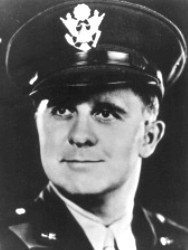Clark PolingÕs father was an Evangelical minister in Lewisburg, Pennsylvania, who had served as a chaplain in World War I. His mother died in 1918, when he was in high school, and his father remarried in 1919, converting to the Baptist faith and becoming an ordained Baptist minister. The family then moved to Poughkeepsie, New York, where Clark attended Oakwood School and excelled on the football team. After graduation he attended Hope College in Michigan, and then Ruggers University in New Jersey, graduating in 1933. Three years later he graduated from Yale Divinity school and was ordained a minister in the Reformed Church in American. When World War II began in 1941, he immediately volunteered for service as a U.S. Army chaplain. At the chaplainÕs school at Harvard he became close friends with three other chaplains, each of different denominations, and the four of them deployed together for the European Theater of Operations. En route, their troop ship the U.S.A.T. Dorchester, was torpedoed in the North Atlantic. All four chaplains, still close friends, despite their differences in denomination, rendered aid and comfort during the sinking of the ship, and gave up their life jackets to other soldiers. Their heroic deaths immortalized them as “The Four Immortal Chaplains of World War II.”

–
Cemetery:
Awards Received
-

Distinguished Service Cross
-
Distinguished Service Cross
Service:
United States ArmyRank:
First Lieutenant (Chaplain’s Corps)Division:
U.S.A.T. DorchesterAction Date:
February 3, 1943
War Department, General Orders No. 93 (December 28, 1944)The President of the United States of America, authorized by Act of Congress, July 9, 1918, takes pride in presenting the Distinguished Service Cross (Posthumously) to First Lieutenant (Chaplain’s Corps) Clark Vandersall Poling (ASN: 0-477425), United States Army, for extraordinary heroism in connection with military operations against an enemy of the United States. On the night of 3 February 1943, the U.S.A.T. Dorchester, a loaded troop transport, was torpedoed without warning by an enemy submarine in the North Atlantic and began to sink rapidly. In the resulting confusion and darkness some men found themselves without life jackets and others became helpless through fear and the dread of plunging into the freezing water. Chaplain Poling with three fellow Chaplains, moved about the deck, heroically and calmly, encouraging the men and assisting them to abandon ship. After the available supply of life jackets was exhausted they gave up their own and remained aboard ship and went down with it, offering words of encouragement and prayers to the last. Chaplain Fox’s great self-sacrifice, personal bravery and zealous devotion to duty exemplifies the highest traditions of the military forces of the United States and reflect great credit upon himself, the Chaplains Corps, and the United States Army.

